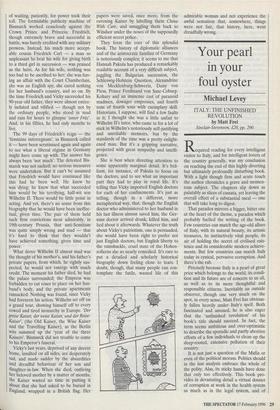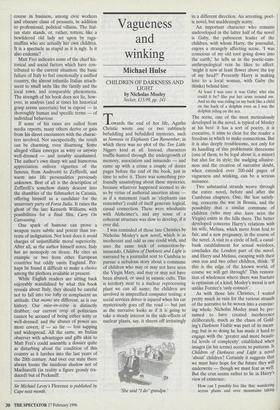Your pearl in your foul oyster
Michael Levey
ITALY: THE UNFINISHED REVOLUTION by Matt Frei Sinclair-Stevenson, £20, pp. 290 Required reading for every intelligent visitor to Italy, and for intelligent lovers of the country generally, was my conclusion on reaching the end of this highly diverting but ultimately profoundly disturbing book. With a light though firm and acute touch the author chronicles a grave and momen- tous subject. The chapters slip down as palatably as slices of cassata, yet leaving the overall effect of a substantial meal — one that will take long to digest.
That paradox mirrors a bigger, bitter one at the heart of the theme, a paradox which probably fuelled the writing of the book. Few countries can match the age-old allure of Italy, with its natural beauty, its artistic treasures, its instinctively vital people, its air of holding the secret of civilised exis- tence and its considerable modern achieve- ments. But few countries can match Italy today in cynical, pervasive corruption. And there's the rub.
Precisely because Italy is a pearl of great price which belongs to the world, its condi- tion and its future are of concern to us all, as well as to its more thoughtful and responsible citizens. Inevitably an outside observer, though one very much on the spot, in every sense, Matt Frei has obvious- ly fallen heavily under Italy's spell. Both fascinated and amused, he is also eager that the 'unfinished revolution' of his book's title should succeed. In fact, the term seems ambitious and over-optimistic to describe the sporadic and partly abortive efforts of a few individuals to clean up the deep-rooted, extensive pollution of their country.
It is not just a question of the Mafia or even of the political morass. Politics should in the last analysis embrace the whole of the polity. Alas, its sticky hands have done that only too effectively. This book pro- vides in devastating detail a virtual dossier of corruption at work in the health system as much as in the legal system, and of course in business, among civic workers and obscure clans of peasants, in addition to professional, political villains. The Ital- ian state stands, or, rather, totters, like a bewildered old lady set upon by raga- muffins who are actually her own children. It is a spectacle as stupid as it is ugly. Is it also endemic?
Matt Frei indicates some of the chief his- torical and social factors which have con- tributed to the current situation: the basic failure of Italy to feel emotionally a unified country, the almost infantile Italian attach- ment to small units like the family and the local town, and comparable phenomena. The strength of his book does not lie, how- ever, in analysis (and at times his historical grasp seems uncertain) but in exposé — in thoroughly human and specific terms — of individual behaviour.
If some of his cases are culled from media reports, many others derive or gain from his direct encounters with the charac- ters involved. Not unexpectedly, the result can be charming, even disarming. Some alleged villain emerges as witty or anyway well-dressed — and notably unashamed. The author's own sharp wit and humorous appreciation enliven vignettes of the famous, from Andreotti to Zeffirelli, and warm into life personalities previously unknown. Best of all is the description of Zeffirelli's somehow dainty descent into the shambles of the fishmarket in Catania, offering himself as a candidate for the unsavoury party of Forza Italia. It raises the ghost of the late Kenneth Williams, with possibilities for a final film, Carry On Canvassing.
One spark of humour can prove a weapon more subtle and potent than tor- rents of indignation. Not least does it avoid charges of unjustifiable moral superiority. After all, as the author himself notes, Italy has no monopoly on sleaze. He cites an example or two from other European countries but oddly omits England. Per- haps he found it difficult to make a choice among the plethora available at present.
While English readers are sitting back enjoyably scandalised by what this book reveals about Italy, they should be careful not to fall into too lofty or complacent an attitude. Our mores are different, as is our history. Our mise-en-scene is distinctly drabber; our current crop of politicians cannot be accused of being either witty or well-dressed; and the abuses of power are more covert, if — so far — less sapping and widespread. All the same, an Italian observer with advantages and gifts akin to Matt Frei's could assemble a dossier quite as disturbing about the condition of this country as it lurches into the last years of the 20th century. And over our state there always looms the insidious shadow not of Machiavelli (in reality a figure grossly tra- duced) but of Pecksniff.
Sir Michael Levey's Florence is published by Cape next month.



























































 Previous page
Previous page